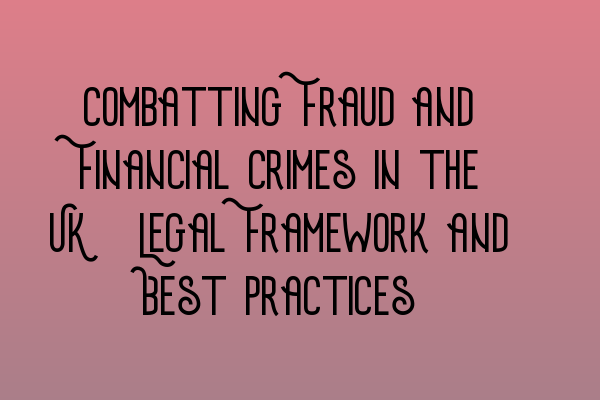Combatting Fraud and Financial Crimes in the UK: Legal Framework and Best Practices
In recent years, fraud and financial crimes have become a major concern not only for individuals but also for businesses and governments. The rise in sophisticated criminal activities such as identity theft, cyber fraud, money laundering, and tax evasion has created a need for a strong legal framework and best practices to combat these crimes effectively. In the UK, the law enforcement agencies, regulatory bodies, and legal professionals play a crucial role in fighting fraud and financial crimes.
The Legal Framework
The legal framework in the UK for combatting fraud and financial crimes is comprehensive and multifaceted. It encompasses various laws, regulations, and acts that empower the authorities to investigate, prosecute, and deter these criminal activities. Some of the key legislation include:
- SQE 1 Preparation Courses: The Fraud Act 2006
- The Proceeds of Crime Act 2002
- The Money Laundering Regulations 2017
- SQE 2 Preparation Courses: The Bribery Act 2010
- The Financial Services and Markets Act 2000
These legislations provide the legal basis for the authorities to investigate and prosecute cases of fraud, money laundering, bribery, and other financial crimes. They also lay down the responsibilities and obligations of individuals and organizations to prevent such criminal activities.
Investigation and Prosecution
The investigation and prosecution of fraud and financial crimes is handled by various law enforcement agencies, including the Serious Fraud Office (SFO), National Crime Agency (NCA), and Financial Conduct Authority (FCA). These agencies work closely with the police, regulatory bodies, and other organizations to gather evidence, conduct thorough investigations, and bring the perpetrators to justice.
The Crown Prosecution Service (CPS) oversees the prosecution process by assessing the evidence gathered by the investigating agencies and determining whether there is a realistic prospect of conviction. If there is, the CPS will proceed with the prosecution.
Prevention and Best Practices
While investigation and prosecution are vital, it is equally important to prevent fraud and financial crimes from happening in the first place. Businesses and individuals can take several measures to protect themselves and reduce the risk of falling victim to these criminal activities:
- Implement robust internal controls and procedures to detect and prevent fraud.
- Regularly review and update anti-money laundering policies in accordance with the Money Laundering Regulations.
- Train employees on recognizing and reporting suspicious activities.
- Conduct due diligence on business partners, clients, and suppliers.
- Keep up-to-date with the latest fraud trends and educate yourself on potential risks.
By integrating these best practices into their operations, businesses can significantly reduce the risk of falling victim to fraud and financial crimes. It is also important to stay informed about the latest developments in the legal framework and regulatory requirements.
Conclusion
Fraud and financial crimes pose a significant threat to individuals, businesses, and communities in the UK. To combat these criminal activities effectively, a robust legal framework, strong enforcement agencies, and best practices for prevention are essential. By staying aware and proactive, individuals and organizations can contribute to creating a safer and more secure financial environment in the UK.
Related Articles:
